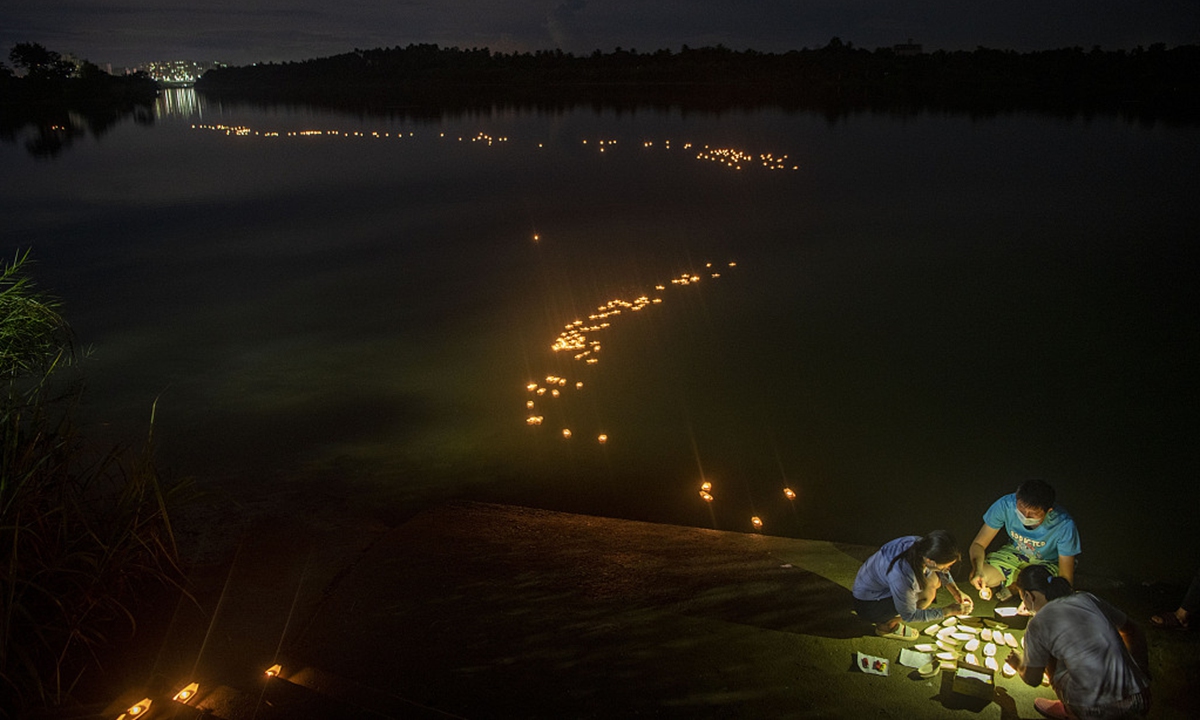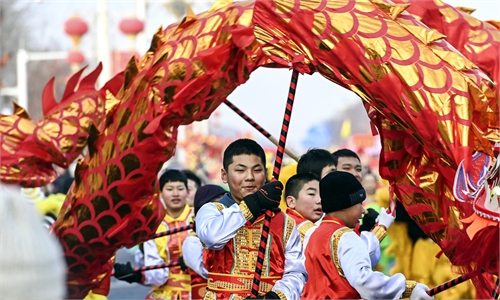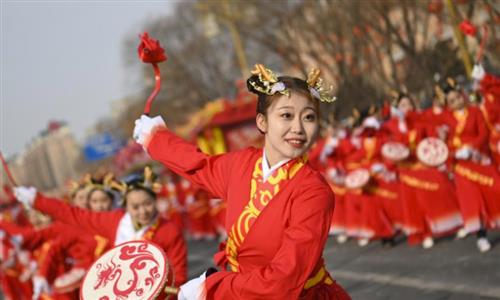ARTS / CULTURE & LEISURE
Zhongyuan Festival: a time for prayer and filial piety
The Zhongyuan Festival, an occasion to pray for safety and express filial piety, falls on the 15th day of the seventh month of the lunar calendar. It happens to fall on Sunday this year.

The Zhongyuan Festival comprises three main elements: worshiping the spirits of the ancestors, religious activities and performances celebrating life. Even though this festival has been influenced by Taoist and Buddhist thought, the origin of Zhongyuan Festival bears a deep Confucian imprint.
It is likely that the festival originated from an ancient ancestor worship tradition. Up until the Wei (220-265), Jin (265-420), and Northern and Southern dynasties (386-589), the ancient rituals we now recognize as Zhongyuan and the Obon Festival were influenced by the growing presence of Buddhism and Taoism. These ancient customs honor and celebrate the lives of deceased family members and friends. Additionally, ancestor worship during this period became closely associated with enjoying seasonal autumn foods.
In ancient China, people started to harvest crops in the seventh month of the lunar year. A common ritual of the time was that of offering the newly harvested grains, fruits and vegetables to the ancestors.
This was also an occasion to get together with relatives, friends and neighbors, which remains a custom in a number of Chinese provinces.
The word "Obon" means to save the soul from distress. During the Tang Dynasty (618-907), the Ullambana Festival was introduced to Japan along with Buddhism and was later called Obon, or Bon. On this day, dead ancestors are believed to return to their living families, so people prepare for the reunion with the performance of Bon Odori, or a Bon dance, to welcome the spirits and pay homage to their sacrifices.
The Zhongyuan Festival is celebrated in different ways across China.
The sixth century classic "Family Instructions," a collection of teachings and advice on family life, ethics and moral conduct written by Yan Zhitui, a notable Confucian scholar of the Northern and Southern Dynasties period (386-589), reminds future generations to honor the Obon Festival, to repay their parents for their kindness and express filial piety.
After the sixth century, Taoism also named the 15th day of July "Festival of Zhongyuan." According to the Taoist philosophy, three basic elements make up everything in the world - heaven, earth and water, and these elements are worshiped on January 15, July 15 and October 15 respectively in the lunar calendar.
Taoists also believe that on this day, the King of Hell frees the spirits of the deceased from the lower realm of the underworld, while Buddhists take it as a day to ease suffering and honor the elderly.
In the Tang Dynasty, officials were granted one to three days of leave to celebrate the Zhongyuan Festival. While since the Northern Song (960-1127), the festival became more about folk customs.
Days before the Zhongyuan Festival, people start preparing paper paste offerings for the worship ritual. On the festival, vegetarian food is put on the offering table in the morning. Many families take time to visit the graves of their ancestors, offering food and incense. This act of remembrance emphasizes respect and the ongoing connection between the living and the dead. Additionally, the government holds a public memorial meeting to pay tribute to the soldiers who died on the front line.
In the evening, after a traditional ceremony, people enjoy watching performances that reflect beloved aspects of local folklore or walk through the night market. Later many gather around a lake, a river or some other water body and release floating water lanterns, also called lotus lanterns, usually made by pasting paper into a lotus shape. A lamp or candle is placed inside it and represents the concept of "yang" (the world of the living), and the lanterns are left floating on the water, which represents the opposite concept of yin (the underworld).
In some regions, traditional performances are also staged in open areas as entertainment for wandering spirits.
The festival is often celebrated at night, when ghosts are believed to be more active.
Finally, according to ancient Chinese customs, some activities that should be avoided during the Zhongyuan Festival. For instance, many people avoid swimming or traveling during this time due to the belief that spirits might cause misfortune.
No matter where you are in China, you can always witness some form of Zhongyuan Festival celebrations and marvel at its centuries-old integration of beliefs and customs derived from Buddhism, Taoism, Confucianism and folk traditions.
Global Times

People in Qionghai City, South China's Hainan Province, release floating water lanterns in the Wanquan River, to celebrate the Zhongyuan Festival on August 12, 2022. Photo: VCG
Also known as the Ghost Festival, the Zhongyuan Festival is a significant event recognized in various East Asian cultures, particularly in Chinese communities. In ancient China, people commemorate the ancestors with food offerings, burning incense and releasing water lanterns.The Zhongyuan Festival comprises three main elements: worshiping the spirits of the ancestors, religious activities and performances celebrating life. Even though this festival has been influenced by Taoist and Buddhist thought, the origin of Zhongyuan Festival bears a deep Confucian imprint.
It is likely that the festival originated from an ancient ancestor worship tradition. Up until the Wei (220-265), Jin (265-420), and Northern and Southern dynasties (386-589), the ancient rituals we now recognize as Zhongyuan and the Obon Festival were influenced by the growing presence of Buddhism and Taoism. These ancient customs honor and celebrate the lives of deceased family members and friends. Additionally, ancestor worship during this period became closely associated with enjoying seasonal autumn foods.
In ancient China, people started to harvest crops in the seventh month of the lunar year. A common ritual of the time was that of offering the newly harvested grains, fruits and vegetables to the ancestors.
This was also an occasion to get together with relatives, friends and neighbors, which remains a custom in a number of Chinese provinces.
The word "Obon" means to save the soul from distress. During the Tang Dynasty (618-907), the Ullambana Festival was introduced to Japan along with Buddhism and was later called Obon, or Bon. On this day, dead ancestors are believed to return to their living families, so people prepare for the reunion with the performance of Bon Odori, or a Bon dance, to welcome the spirits and pay homage to their sacrifices.
The Zhongyuan Festival is celebrated in different ways across China.
The sixth century classic "Family Instructions," a collection of teachings and advice on family life, ethics and moral conduct written by Yan Zhitui, a notable Confucian scholar of the Northern and Southern Dynasties period (386-589), reminds future generations to honor the Obon Festival, to repay their parents for their kindness and express filial piety.
After the sixth century, Taoism also named the 15th day of July "Festival of Zhongyuan." According to the Taoist philosophy, three basic elements make up everything in the world - heaven, earth and water, and these elements are worshiped on January 15, July 15 and October 15 respectively in the lunar calendar.
Taoists also believe that on this day, the King of Hell frees the spirits of the deceased from the lower realm of the underworld, while Buddhists take it as a day to ease suffering and honor the elderly.
In the Tang Dynasty, officials were granted one to three days of leave to celebrate the Zhongyuan Festival. While since the Northern Song (960-1127), the festival became more about folk customs.
Days before the Zhongyuan Festival, people start preparing paper paste offerings for the worship ritual. On the festival, vegetarian food is put on the offering table in the morning. Many families take time to visit the graves of their ancestors, offering food and incense. This act of remembrance emphasizes respect and the ongoing connection between the living and the dead. Additionally, the government holds a public memorial meeting to pay tribute to the soldiers who died on the front line.
In the evening, after a traditional ceremony, people enjoy watching performances that reflect beloved aspects of local folklore or walk through the night market. Later many gather around a lake, a river or some other water body and release floating water lanterns, also called lotus lanterns, usually made by pasting paper into a lotus shape. A lamp or candle is placed inside it and represents the concept of "yang" (the world of the living), and the lanterns are left floating on the water, which represents the opposite concept of yin (the underworld).
In some regions, traditional performances are also staged in open areas as entertainment for wandering spirits.
The festival is often celebrated at night, when ghosts are believed to be more active.
Finally, according to ancient Chinese customs, some activities that should be avoided during the Zhongyuan Festival. For instance, many people avoid swimming or traveling during this time due to the belief that spirits might cause misfortune.
No matter where you are in China, you can always witness some form of Zhongyuan Festival celebrations and marvel at its centuries-old integration of beliefs and customs derived from Buddhism, Taoism, Confucianism and folk traditions.
Global Times


